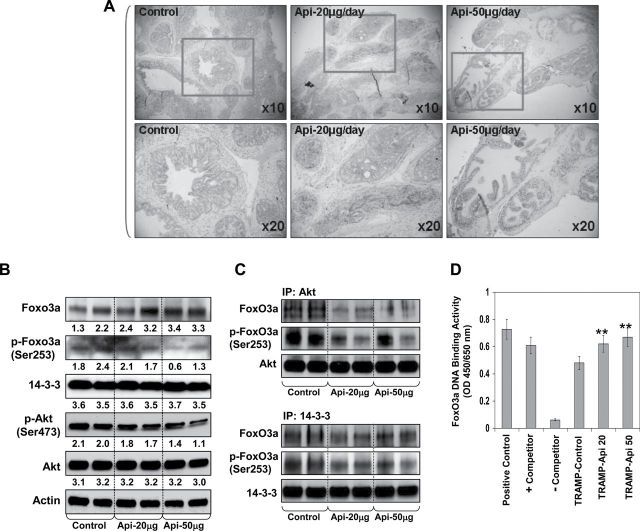Fig. 3.
Effect of apigenin administration on the expression of FoxO3a, p-FoxO3a (Ser253), Akt, p-Akt (Ser473) and 14-3-3 in the dorsolateral prostate of TRAMP mice. Apigenin was administered at 20 and 50 μg/mouse/day (wt/vol) by gavage in 0.2 ml of a vehicle consisting of 0.5% methyl cellulose and 0.025% Tween 20 to TRAMP mice beginning at 8 weeks of age for 20 weeks till experiment was terminated. (A) IHC of FoxO3a in the dorsolateral prostate from control and apigenin-treated TRAMP mice. An increase in the nuclear presence of FoxO3a is observed after apigenin treatment. (B) Protein expression of FoxO3a, Akt and their phosphorylated forms, 14-3-3 as determined by western blot analysis. A significant decrease in Akt and FoxO3a phosphorylation is observed after apigenin treatment. Bands were quantitated by densitometric analysis. Numeric values represent the protein level normalized to the loading control (actin). (C) Coimmunoprecipitation analysis of FoxO3a and p-FoxO3a (Ser253) with Akt and 14-3-3 chaperone. A significant decrease in FoxO3a binding with Akt and 14-3-3 is observed after apigenin treatment. (D) Nuclear FoxO3A DNA binding in the dorsolateral prostate of TRAMP mice after apigenin feeding. A significant increase in the nuclear FoxO3a binding was observed after apigenin treatment. **P < 0.001 TRAMP control versus TRAMP apigenin. Mean ± SD of four mice. Details are described in Materials and methods.

